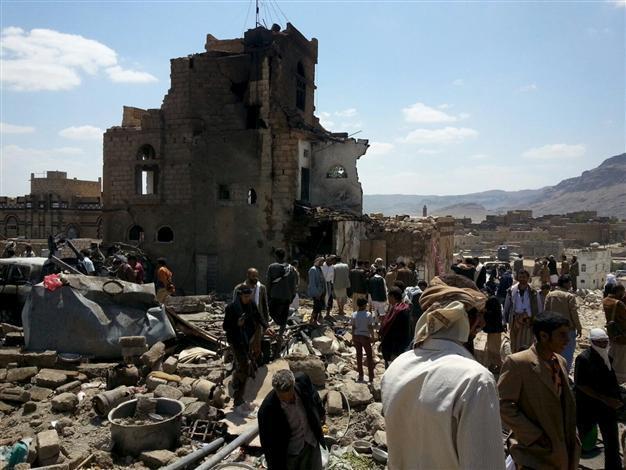Yemen child prodigy badly burned in wedding bombing
DUBAI - Reuters

People gather at the site of a Saudi-led air strike in central in Yemen in this October 8, 2015 handout provided by the al-Sanabani family. A child prodigy who once dreamed of leading a Yemeni space program, 15-year old Abdullah al-Sanabani may now lose his leg and fingers after a suspected Saudi-led air strike on a family wedding killed his relatives and left him badly burned. Reuters Photo
A child prodigy who once dreamed of leading a Yemeni space programme, 15-year old Abdullah al-Sanabani may now lose his leg and fingers after a suspected Saudi-led air strike on a family wedding killed his relatives and left him badly burned.
Abdullah's intellect shined a rare bright light on desperately poor, war-damaged Yemen, where tragedies like his are now routine for a generation struggling for a decent future.
Six months of conflict between a Saudi-led alliance and the Shi'ite Houthi forces in control of the capital, has killed at least 500 children, according to the United Nations. Countless others have been forced to go hungry, flee home for their lives, or join the fight as child soldiers.
The young scientist's invention of a solar-powered remote control car that could flip over and become a boat won him an international competition in 2012 and a free visit to NASA, the American space agency.
Asked if he would stay focused on his studies and advance science in his now war-torn homeland, a tired Abdullah, who is convalescing in a Jordanian hospital said, "God willing."
His uncle Hussam remembers the boy tinkering with gadgets and charging mobile phones with solar panels, but wonders anxiously whether he will be able to enjoy his passion.
"He was so into life, into learning, English and computers. All of his dreams and aspirations could be lost now. His future is now in the hands of fate."
A success story in the making, Abdullah's progress halted when a wedding party he attended with extended family was hit by a missile in central Yemen on Oct. 7.
"Three of my wife's brothers were all having a wedding. At around 9:30 at night when the brides arrived to the house, we heard the sound of the Saudi airplanes attack it with missiles," the boy's father, Qais, told Reuters from the burn unit ward in Amman' King Hussein hospital.
A groom and a bride were killed along with two of Abdullah's grandparents, an aunt, two uncles and several young cousins. In all at least 43 people were killed in the attack, including 15 children.
Residents and medics at the scene blamed the explosion on an air strike. A Saudi military spokesman denied this and said it was the work of the Houthis, accusing them of trying to divert attention away from military losses elsewhere.
Young victims "Around 45 percent of his body has second and third degree burns. The five fingers on his right hand and his left leg are burnt, and the doctors are deciding whether to keep them or take them off," Abdullah's father Qais added.
The incident follows a blast at another wedding party last month which killed 131 people. Again, residents blamed Saudi-led jets, which the coalition denied.
Over 5,400 people have died in ground fighting and air strikes since Gulf Arab forces intervened in a civil war there in March to restore the government ousted by the Houthi militia group, which says it's fighting a revolution.
The contending justifications for the war mean little to its youngest victims, from the half of Yemen's population that is under 18.
"With every day that passes, children see their hopes and dreams for the future shattered," UNICEF Representative in Yemen Julien Harneis said this month, noting that the group had confirmed scores of schools and hospitals damaged in combat.
"Their homes, schools and communities are being destroyed, and their own lives are increasingly threatened by disease and malnutrition."
But rebuilding the country and defying its current disasters will require kids like Abdullah to recover and not lose hope.
"I'm proud. Not just for myself, but for Yemen," he told a charmed audience at TEDx conference in Yemen after his prize in 2012 wearing a T-shirt that said "NASA: I need my space."
"Anyway, there are geniuses among the students in Yemen. God willing, we might have something even better than NASA."
